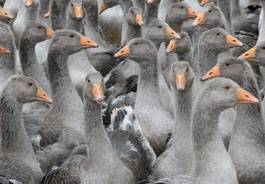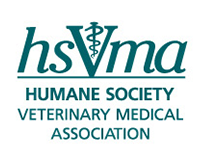California Bids Adieu to Foie GrasJuly 13, 2012 by Laurie Siperstein-Cook, DVM  Ducks and geese in California will no longer be subjected to overfeeding to produce foie gras. Jan van der Hoeven On July 1, a California law banning the cruel force feeding of ducks and geese to produce foie gras, or fatty liver pâté, along with an outright state-wide ban on the sale of foie gras from force-fed birds, finally takes effect after a seven-and-a-half year delayed implementation period. It has been a long legislative process, and in conjunction with HSVMA’s predecessor organization, the Association of Veterinarians for Animal Rights (AVAR), I lobbied for Senate Bill 1520 during its legislative journey in 2004. I made a number of trips to the state capitol in Sacramento and testified at multiple hearings in support of the bill in conjunction with AVAR, which was one of the official sponsors of the successful legislation. It gives me great satisfaction to know that our advocacy work will now tangibly improve the health and welfare of commercially-raised ducks and geese in California. In order to produce foie gras, farm workers use a pipe to forcefully over-feed ducks and geese unnaturally large amounts of grain and fat. This process causes the birds to develop hepatic lipidosis, a condition in which their severely compromised livers can swell to 10 times their normal size. The birds are then slaughtered and the engorged, diseased organs are sold as foie gras, which means "fatty liver" in French. The science is clear: Mortality rates for farm birds force-fed for production purposes are 10-20 times higher than those birds who are not. As a veterinarian, what concerns me most about this forceful overfeeding is the fact that the birds are made clinically ill by the process. If it were being inflicted on animals of any other species, or for any reason other than to create a gourmet "delicacy," this process would be considered cruelty by everyone—and a 2004 poll revealed 74% of Americans agree it should be banned. Ian Duncan, Ph.D, emeritus chair in Animal Behavior & Welfare at the University of Guelph (Ontario, Canada) says that "the forced feeding of ducks and geese for the production of foie gras is a cruel and inhumane practice that should be banned." Worldwide, more than a dozen countries, including Argentina, Denmark, Finland, Germany, Israel, Norway, Poland, Sweden, Switzerland and the UK, have either prohibited foie gras production outright or interpreted it as illegal under their existing anti-cruelty laws. In California, more than 99% of restaurants do not serve foie gras and over 100 restaurateurs dropped it from their menus since SB 1520 was passed. Although in my capacity as chief of shelter medicine at the Sacramento SPCA most of my medical work is focused on dogs and cats, I agree with the HSVMA’s goal to protect all animals from cruelty, not just the ones that live in our homes. Personally, I like to blur the artificial distinctions between pets, farm animals and wildlife—and even feral cats—when it comes to defining what cruelty and suffering are, and what our responsibilities should be in protecting these animals.
 Dr. Laurie Siperstein-Cook Mayeflower Photography Dr. Laurie Siperstein-Cook is a 1989 graduate of the University of California, Davis, School of Veterinary Medicine. She has worked in a variety of veterinary fields, including wildlife rehabilitation, companion avian medicine and small animal medicine and surgery. She has given lectures and has testified for legislative committees on animal welfare issues, and produced a video for veterinarians promoting early-age neutering. She is currently the Chief of Shelter Medicine for the Sacramento SPCA. |
